Urban Tech Xchange and Detroit Smart Parking Lab
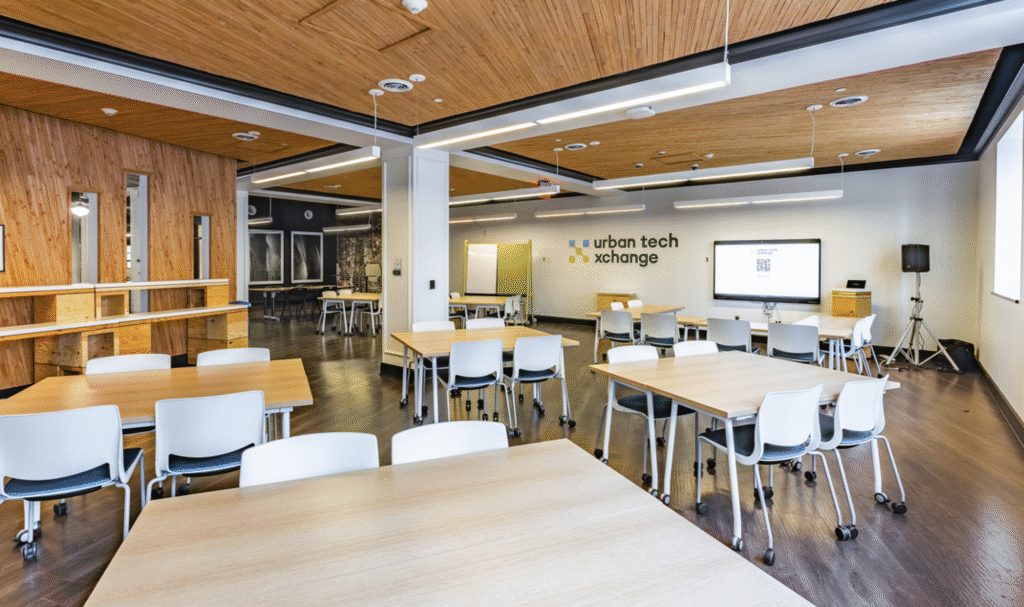
Now in its fourth year of operation, Urban Tech Xchange (UTX) has become a living laboratory where emerging technology startups can test, refine, and validate smart urban systems in real-world conditions. Launched through a collaboration between Bedrock, Bosch, Cisco, and Kode Labs, UTX builds on the foundation of the Detroit Smart Parking Lab (founded earlier by Bedrock, Ford, MEDC, and Bosch) expanding its scope beyond parking into logistics, energy, building automation, accessibility, and freshwater tech. What differentiates UTX from other technology incubators and accelerators is its emphasis on real-world deployment. Rather than testing concepts in isolation, startups pilot technologies directly within Detroit’s streets, curbsides, buildings, and rooftops, allowing solutions to be measured against real constraints such as emissions reduction, infrastructure utilization, and resident impact. Over the past four years, that approach has helped deploy dozens of pilots and move some into active use. SBN Detroit interviewed Kevin Mull, Bedrock’s Senior Director for Strategic Initiatives, about how Southeast Michigan’s legacy industries are shaping the next era of sustainable urban logistics—and how incremental efficiencies can deliver meaningful environmental gains at city scale. Q: What factors help position Southeast Michigan to rethink how urban logistics can improve daily life in cities like Detroit? A: Southeast Michigan has been designing, building, and deploying mobility solutions for generations. What’s different right now is that we’re at a special moment where the relationships, the talent, and the physical space all align. We have room to test ideas, and we have strong public-private partnerships that allow us to deploy technology. Bedrock’s Detroit Smart Parking Lab (DSPL) and Urban Tech Xchange (UTX) give startups the ability to move beyond theory. Through platforms like the Michigan Mobility Funding Platform, we’ve been able to deploy a million dollars in grants to early-stage companies tackling real logistics and mobility challenges. Over the past four years, several of those pilots have become production-ready solutions now operating across Detroit—from curbside EV charging to streetlight-mounted charging systems. Q: How do wasted miles, underused infrastructure, or inefficient logistics affect urban environments and quality of life? A: Wasted miles translate directly into congestion, emissions, and frustration. Vehicles circling for parking, trucks idling in residential areas, or delivery vehicles double-parking because curb space isn’t managed well—all of that erodes the day-to-day experience of a city. Underutilized infrastructure is another big issue. Curbsides, loading zones, rooftops—these are valuable assets that often aren’t managed intentionally. At Bedrock alone, we process roughly 100,000 parking transactions per month. Every single one of those transactions is an opportunity to reduce friction or create value. We are focusing on solutions that remove friction. One example is IONDynamics, that’s working on automated EV charging. Another is HEVO – a wireless charging solution. Small improvements, repeated thousands of times, add up quickly. Q: How do smarter logistics systems change the way residents experience sustainability day to day? A: Sustainability becomes tangible when it improves daily life. Fewer vehicles circling means cleaner air and quieter streets. Better-managed loading zones mean safer sidewalks. More predictable deliveries mean less congestion during peak hours. One pilot we ran used a small autonomous robot to transport food scraps between restaurants and upcycling locations. Over the course of that project, it diverted more than 2,600 pounds of food waste and eliminated nearly 1,200 pounds of greenhouse gas emissions by replacing traditional vehicle trips. It also avoided the use of about 56 gallons of fuel. Those numbers matter, but what residents notice is the absence of friction—less noise, less traffic, and fewer large vehicles in tight residential spaces. Sustainability works best when it’s embedded into systems people already rely on. Q: How can improved last-mile logistics help reduce unnecessary driving and strengthen neighborhood connectivity? A: The last mile is one of the most important parts of the logistics chain and is often the most inefficient. A lot of energy is going into that space right now because it has outsized impact. Better coordination of curb space, smarter delivery scheduling, and multimodal solutions all reduce the need for unnecessary trips. When people can reliably park, receive deliveries, or access transit without friction, neighborhoods become more functional and connected. We focus on the edges—where parking garages meet transit, where delivery vehicles meet sidewalks, where people move between modes. Improving those interfaces creates meaningful gains without massive infrastructure investments. Q: Many of the technologies supported by UTX reduce congestion and emissions. How do you think about sustainability in this work? A: Sustainability is an outcome of better systems rather than the starting point. When you reduce wasted miles, idle time, and inefficient use of infrastructure, the environmental benefits follow naturally. If we can take miles off the street, shorten dwell times, or make curb space and parking more productive, we reduce emissions without asking people to change their behaviors. Across the Bedrock portfolio, we also think a lot about avoided infrastructure. For example, we’re exploring automated valet parking technology start-ups that aim to allow cars to park closer together and improve garage efficiency by an estimated 20 percent. That can delay—or eliminate—the need to build new parking structures, which has a significant embodied carbon impact. Another example is an automated robot charging solution from Ion Dynamics, which has a charging robot move to the vehicles require charging, which is a dynamic solution that avoids adding costly fixed charging infrastructure. The same logic applies to delivery drones, ground-based robots, and micro-mobility. Moving packages through the air or via small electric vehicles instead of gas-powered trucks reduces fuel consumption and congestion. Q: Where do you see the biggest opportunities for Southeast Michigan cities to improve logistics in ways that benefit both residents and businesses? A: The opportunities are everywhere, but they’re often measured in inches rather than miles. Smarter curbside management. Better coordination between delivery systems and transit hubs. More efficient use of shared infrastructure. Individually, these improvements may seem small. But in the aggregate, they have outsized impact. Through platforms like UTX and DSPL, we’re helping startups test those ideas, refine them, and scale what
Bosch to Invest $13.7 Million in Hydrogen Research and Development Hub in Farmington Hills
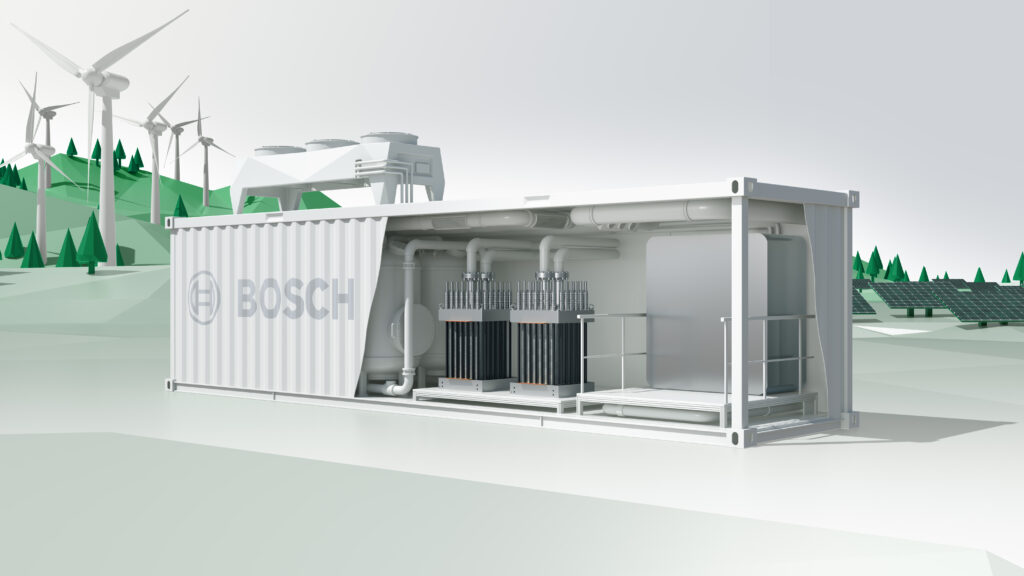
Hydrogen technology is gaining attention as a potential solution for reducing carbon emissions and supporting clean energy initiatives. Bosch is expanding its research and development efforts in Michigan with a new hydrogen hub, supported by the Michigan Business Development Program. The project focuses on advancing fuel cell and hydrogen engine technology, with applications in transportation and other industries. SBN Detroit asked Matt Thorington, Engineering Manager of Hydrogen Stacks and Systems at Bosch USA, about the company’s vision for hydrogen, the impact of its new hydrogen hub, and the role Michigan plays in driving clean energy innovation. Q: Regarding Bosch’s commitment to advance hydrogen technology – what drives this investment, and what are the ultimate goals of the hydrogen hub? A: Hydrogen will play a role in a diversified mix of powertrain options in the future. Hydrogen is used in many other sectors, all of which, including mobility, will benefit from clean hydrogen production via water electrolysis. Our work at the Farmington Hills location underscores our commitment to advancing hydrogen technology, enabling us to deliver innovative solutions that support our customers’ needs and drive progress toward the hydrogen economy. Q: Given the Michigan Business Development Program grant, how important is the state’s support in facilitating innovation and expanding clean energy infrastructure? A: The addition of this hydrogen research and development space will help empower innovative developments throughout the hydrogen lifecycle, allowing for improved integration. This $13.7 million Michigan Business Development Program grant will enable extensive upgrades and restructuring of 2,200 square feet of existing space to support further development of the Proton Exchange Membrane (PEM) fuel cell power module and the Proton Exchange Membrane electrolyzer stack for hydrogen production. Q: Bosch has identified hydrogen as a key part of a diversified powertrain future. How exactly will the hub facilitate and support this? A: Fuel cells are highly efficient at converting hydrogen into electricity, and when powered by green hydrogen (produced via renewable energy), fuel cell electric vehicles offer a sustainable transportation solution with a low environmental footprint. With the fuel cell, Bosch is offering a solution – especially for long-haul trucks. Fuel cells have attained the technological maturity required for broad-based use, initially in commercial trucking. Q: What specific sustainability challenges does this hydrogen hub aim to address, both locally in Michigan and globally? A: Fuel cell vehicles produce only water vapor as a byproduct, making them a clean alternative to traditional internal combustion engine vehicles and contributing to improved air quality and reduced greenhouse gas emissions. Another bonus: fuel cell vehicles can be refueled in just a few minutes at hydrogen stations, offering refueling convenience similar to conventional vehicles. They also provide longer driving ranges compared to many battery electric vehicles, making them ideal for long-distance travel, thereby enabling the possibility to help decarbonize the ‘hard to abate’ sectors such as HD mobility, industrial, and power sectors. For applications that run for a long time at high loads, a hydrogen engine is an attractive solution that helps to enable decarbonization while largely maintaining the existing powertrain. Bosch is developing injection and ignition systems for both port fuel and direct injection of hydrogen, designed to enable OEMs to utilize approximately 90% of the existing engine and vehicle architecture, and quickly adopt the hardware to hydrogen fuel. The success of fuel cell technology and hydrogen engine technology is further buoyed by the hydrogen hubs in the U.S.. More applications will help these technologies to establish a foothold in key initial markets. Q: How will this project contribute to Michigan’s role in clean energy and hydrogen development? A: Hydrogen offers immense potential as a low-carbon fuel that can reduce greenhouse gas emissions, improve energy security, and drive economic growth. I’m thankful that the State of Michigan continues to invest in clean energy and hydrogen development. Q: What impact on jobs will this new hydrogen hub have? A: The Regional Hydrogen Research and Development Hub at Bosch’s Farmington Hills headquarters facility is anticipated to create 28 new jobs in mechanical, electrical and chemical engineering over a three-year period. Q: What are Bosch’s next steps in hydrogen innovation, and could we see further expansions or additional hydrogen-focused projects in Michigan? A: Fuel cell power modules are only the beginning for Bosch. Today’s engine and powertrain technologies, along with the corresponding vehicle architectures, provide a solid platform for the development of hydrogen engines, especially since a significant portion of existing development and manufacturing technologies can be re-utilized. The basic structure of the fuel, air, and exhaust system can be adopted from existing powertrain solutions. A hydrogen engine can do everything a diesel engine does, but on top of that, it can contribute to improved air quality and reduced greenhouse gas emissions. Although its efficiency is lower than that of a fuel cell when loads are light to moderate, it is more efficient for full loads. Be sure to subscribe to our newsletter for regular updates on sustainable business practices in and around Detroit.
Urban Tech Xchange Facilitates Real-World Testing to Create Sustainable Urban Solutions
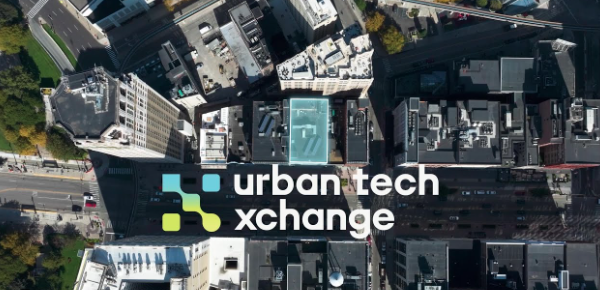
Nearly six months ago the Urban Tech Xchange (UTX) launched in Detroit – an innovative lab hosting a series of startups to advance smart city technologies. UTX is a collaboration between Bedrock, Bosch, Cisco, and KODE Labs and is operated by NextEnergy. The space provides a real-world test facility for the progression of sustainable urban solutions. Kevin Mull, senior director for the Office of Urban Strategy and Innovation at Bedrock, sat down with SBN Detroit to discuss the work being done there. Q: Impetus behind UTX? A: In 2021 Bedrock worked with Bosch, Ford, and the Michigan Economic Development Corp. (MEDC) to launch the Detroit Smart Parking Lab (DSPL) at our Assembly Parking Garage. This lab was specifically designed to accommodate open innovation, allowing startups to quickly and effectively deploy early-stage mobility technologies in a real-world testing environment. The concept has worked so well that we began to think about what’s next… being Detroit’s largest real estate developer, it made sense to try to apply those same methods to developing and deploying technologies for the built environment. The DSPL’s focus is mobility and transportation, which in many ways is dependent upon infrastructure, so the Urban Tech Xchange (UTX) was its natural progression. Q: In what ways does UTX help to foster a more resilient Southeast Michigan? A: I think it brings attention to the region’s entrepreneurial spirit and helps define Detroit as a place for innovation while adding another layer to its creator ecosystem. It also gives us a chance to further collaborate with stakeholders here in Southeast Michigan. Between the DSPL, TechTown, Michigan Central, Centrepolis Accelerator, and others like those, and our universities and colleges, and now UTX, we have an emerging set of platforms for continuing to attract and cultivate new ideas and advance open innovation throughout the state. Q: Why the combination of Bosch, Cisco, Bedrock and KODE Labs? A: Bosch and Bedrock are natural cofounders as they have complementary business concepts. Bosch is a lead innovator in energy and building management, while Bedrock is a city builder whose development projects throughout the central business district range from residential and commercial development to hospitality and retail. Cisco is a globally recognized brand and a huge player in smart infrastructure deployment, while KODE Labs is uniquely positioned as a Detroit-based startup focused on smart building technology that has recently experienced tremendous growth. The four companies together bring all the expertise for supporting a sustainable innovation platform, and importantly, maintain a strong Detroit presence. Q: How will Bedrock data be used to design sustainable solutions? A: This is the first-in-the-world kind of opportunity that’s driven by the uniquely dense portfolio we have in Detroit. We have this construct we are working on called a data lake, which is the aggregation of the data that comes from Bedrock’s 17 million square feet of real estate across Detroit. Its access to this unique operational data, combined with publicly accessible information like that from Census Data and the U.S. Energy Information Administration, provides lab participants with the unique opportunity to tie into a broad real estate ecosystem. We encourage and want anyone who engages with UTX to integrate their data as well, and under the right governance, we can offer this data lake to third-party developers for innovation. Q: In what ways are energy usage and decarbonization being looked at? A: Technologies like those being tested and deployed through the UTX platform allow us to track energy usage in real-time and better understand asset optimization. This provides us with the ability to cut back quickly and efficiently on carbon intensity. For example, heat pumps are a great technology but in certain situations, traditional heating systems might actually create less carbon. Real-world and real-time testing will help reveal this. The more data we get, the better decision-making we have and that can support AI applications as well. So first, it’s about understanding where a building is using energy, then understanding how the building responds to energy usage profiles. Q: Elaborate on how UTX is forming best practices for ensuring equity in urban tech solutions. A: When we set out to develop UTX we engaged several stakeholders such as community organizations, local government, public schools, and other platforms to all weigh in. Our work is fully transparent and there is a lot of communication in terms of where we are applying the technologies. For example, we are currently deploying tech in an area of Detroit to better understand air and noise pollution. We are working side-by-side with the community to make sure businesses and residents understand where we are doing this, how we are doing it, and in what ways the information will be used. Communication is paramount when trying to achieve equity in tech deployment. Q: In what ways does all of this work being done here impact businesses in Southeast Michigan? A: I look at it as a bidirectional flow. By establishing the UTX platform, we are helping to attract the best and brightest to deploy their innovations locally. Conversely, established local businesses have the opportunity to plug into a platform that provides a potential global spotlight. Q: What are some examples of new technology that’s being developed there? A: There are several examples of building automation systems, such as using smart blinds that automatically adjust to provide maximum natural sunlight based on occupancy and interior temperature. What I find very interesting are new systems for tracking and automating accessibility. One such deployment is smart communication between power wheelchairs and elevators. … The elevator is automatically called when the wheelchair arrives! Q: Do you think UTX is a differentiator for Detroit? A: Yes. Again, it puts Detroit on the map as a place that’s committed to, and capable of driving innovations and setting benchmarks and best practices for sustainable urban solutions. UTX is putting a stake in the ground for sustainable tech in an urban environment. Detroit is where the innovation is happening. Be sure to subscribe to our newsletter for regular updates
Bosch and Sustainability in Detroit
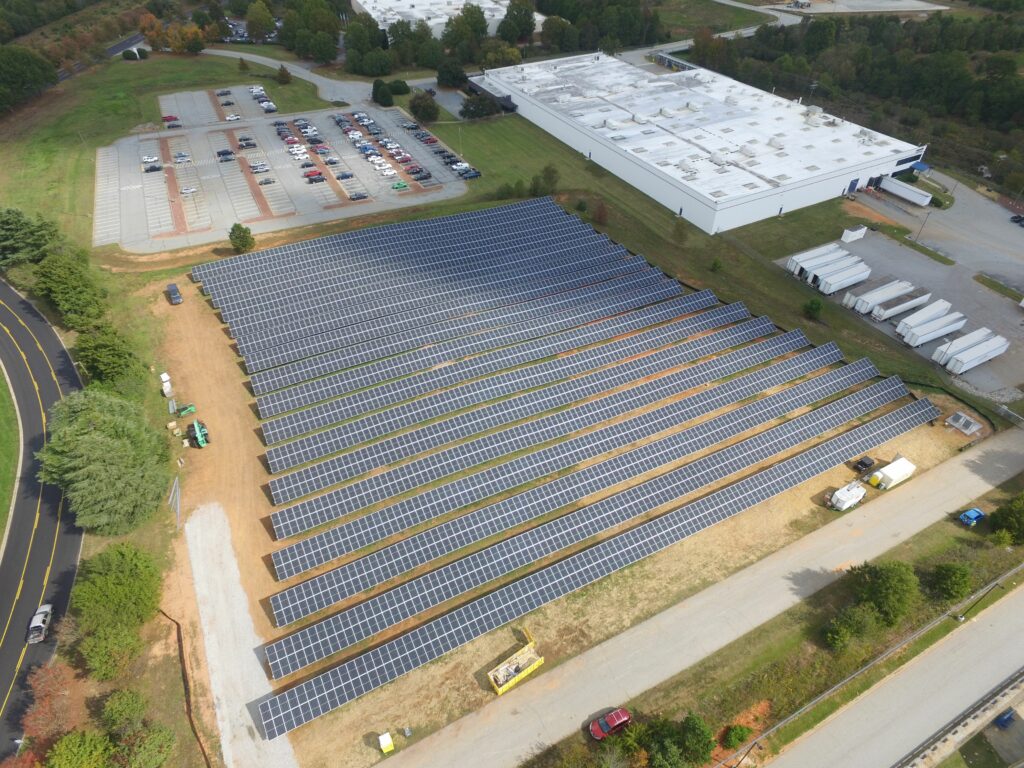
Bosch is a Germany-based global supplier of technology and services that employs 421,000 employees worldwide in over 60 companies. It has technical centers in Farmington Hills and Plymouth. We spoke to Tracy Rosol, carbon neutrality coordinator for the U.S. and Canada, about how the company approaches and manages sustainability. Q: How does Bosch approach carbon neutrality? A: In 2019, our leadership announced that Bosch would become 100% carbon neutral. We established committees in a multitude of countries and put key people in place to procure new green energy and carbon credits to offset emissions. We created a database where locations worldwide submit information like how much energy, water, and gas each is using. Q: What is your role in this? A: Germany is our hub and all initiatives roll out from there and cascade down. My main role at Bosch is operations support analyst – and I am also the carbon neutrality coordinator for the US and Canada. We have a carbon neutrality coordinator in every country. Q: What are your goals in this role? A: We had requirements to be 100% carbon neutral, and we reached that goal in 2020. It was not an option to fail. The entire company – over 400 locations worldwide – has reached this goal. Q: Tell us about some of the internal initiatives Bosch has implemented to protect the environment. A: Bosch works to invent things to make life better. We are working on different fuel systems, working on recycling programs, and composting programs. Within the facilities, there are many initiatives to ensure we are landfill-free. We work with local amenities for plastic pickup. Our cafeterias use compostable items and composting bins. What trash we do have is incinerated. We are working on technologies to reduce energy usage in our plants and also in homes. All of our lighting has now been changed to LED and we use motion detectors. We are working to install solar on sites. Bosch purchases carbon credits on behalf of all employee flights in an effort to offset flight emissions. It’s built into travel costs. This is all driven globally. Q: What is the sustainability approach when it comes to products? A: Let’s just use a pen as an example of a product. Bosch’s goal, as well as the OEM’s, is to make sure the entire process of developing this pen is sustainable. This involves what materials are being used, where the materials are procured from, what ink is being used, the packaging, the transport … all along the chain every piece needs to be sustainable. We are also pushing all other businesses we do business with to utilize sustainable practices. Q: What are the challenges? A: The biggest challenge is ensuring where our renewable energy credits come from and making sure all locations are being issued the credits for the recs. The challenge is tracking it. This involves handling a lot of data across all locations. Additionally, the market is challenged because so many companies are looking to procure renewable energy. This causes the price to fluctuate, and it’s a constantly changing market. We don’t want to over-purchase or under-purchase so it’s a challenge to manage this. Q: How are partners vetted when it comes to sustainability? A: We have a third-party vendor that is directly connected to the markets so they do this for us. We also have an external legal company. Bosch is not an expert in these areas and won’t pretend to be, so we go to the experts and use them to assist us in all of this. Q: What advice do you offer to businesses looking to contribute to sustainability overall? A: Begin with low-hanging fruit. Take a look at where you are wasting energy and start to make a change. Things like putting in motion detectors and switching to LED are good places to start. Reduce where you can. Utilize composting. Put recycling processes in place. From there, find a reputable company to walk you through it. Companies like Honda have partnered with Detroit Edison to put on webinars. Attend the webinars and begin to learn. Find ways to lean on experts and use their resources. Bosch did not do this overnight. We started in 2016 and worked at it over time. Be sure to subscribe to our newsletter for regular updates on sustainable business practices in and around Detroit.
Automotive Leaders Discuss Navigating the Shift to Mobility
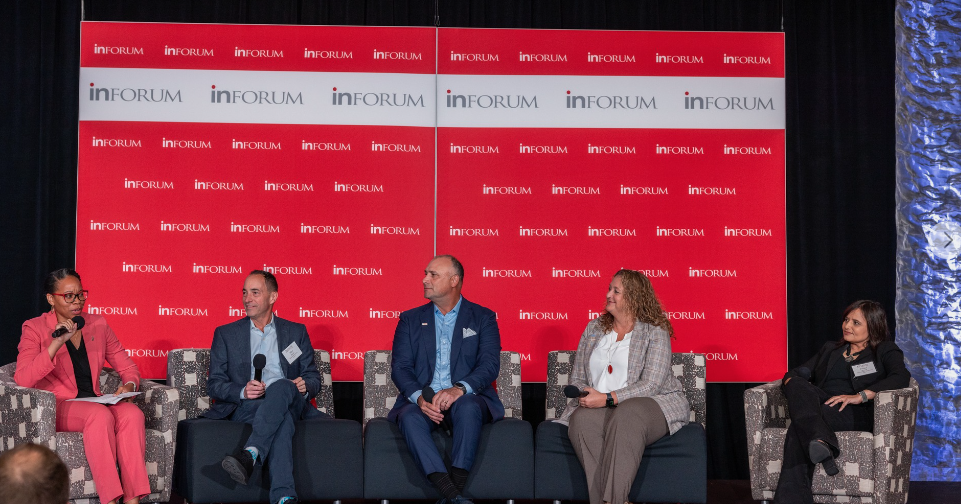
Automotive always has been a technology-driven industry, but in the next ten years, there is likely to be more change in the industry than there has been in the last hundred. And much of that change will be taking place in Michigan. That shift – which moves automotive toward becoming a more sustainable industry – was the topic of a Sept. 15, 2023, breakfast, “Navigating the Shift to Mobility – With Detroit as a Leader,” hosted by Inforum, a nonprofit focused on accelerating women’s careers. The themes included diversity, new opportunities that come with and from young and emerging talent, the power of partnerships, and the future of mobility. Panelists were: Aruna Anand, President and CEO, Automotive Group Sector; head of architecture and networking, Continental North America Kristen Tabar, group vice president, Advanced Mobility Research & Development, Toyota North America Paul Thomas, president, Mobility in Americas, Bosch (effective Jan. 1, 2024), and Alan Wexler, senior vice president, strategy, and innovation, General Motors Justine Johnson, chief mobility officer for the State of Michigan, moderated the discussion. Our takeaways follow: Thomas: When you look for talent, look for talent that looks different from you. Different countries, beliefs, and perspectives, you have to look for talent that has diverse opinions on solutions. The world isn’t as simple as you think it is sometimes. Taber: When students look for a job, remember that it is not a one-and-done deal. You may think this is your passion and you work in this space, but what we see is that people evolve. That cross-pollination and common way to move throughout your career and experience different aspects of this new mobility solution. It’s a completely different landscape that requires different skill sets and backgrounds. Anand: We need to see ourselves in those positions that we are aspiring to be. If you do not have representation, then you don’t know what it’s like and you don’t have the confidence to do something because it is not done. We need to increase the pipeline. Then you understand the reasons why you can’t do this or what else you can do to fix it. Wexler: We see a world with zero crashes, zero emissions, zero congestion. Taber: It is about the products that we put out, how we operate our businesses, and the ripple effect on our supply chains. We need very clear, measurable methods so we are using similar yardsticks. Thomas: We want to invest in communities, we invest in Detroit and the Midwest very heavily to bring mobility people into our companies. We are also always on the diversity journey. You will never know when you are done because diversity is something that you always must work on. Anand: We tend to want to be perfect before we try new things. We find reasons to not be good at things. What is stopping us? We need that coaching, mentoring, role models, all of that together to build that pipeline better. Wexler: (Talent recruitment) really starts with the “why.” … We need skillsets from other industries. We’re becoming more technology-oriented … we pioneer the innovations that move and connect people to what matters, so it’s who wants to be part of that purpose and do something impactful. Taber: We have to understand that none of us is going to be able to move the technology forward by ourselves. It is going to take partnerships that we probably wouldn’t have thought of ever before. Anand: If we can provide an environment that is flexible, then the talents will be able to grow. Thomas: The ecosystem is so large and the opportunities to do different things are available to each one of you in the room. There is so much information out there on how to get involved in mobility. Wexler: There isn’t another industry that has the same opportunity to heal the planet. Experience the full event here. Be sure to subscribe to our newsletter for regular updates on sustainable business practices in and around Detroit.


